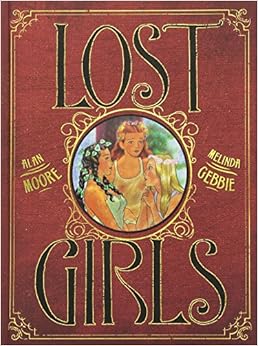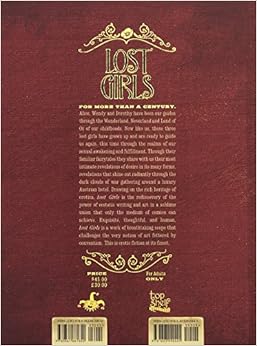Starred Review. [Signature]
Reviewed by Neil GaimanAlmost 10 years before his
The League of Extraordinary Gentlemen took many of the figures of Victorian popular fiction on a remarkable romp, Alan Moore, in collaboration with underground artist Melinda Gebbie, began
Lost Girls, with a similar, although less fantastical, conceit: that the three women whose adventures in girlhood may have inspired respectively,
Alice's Adventures in Wonderland,
Peter Pan and Wendy and the
Wizard of Oz, meet in a Swiss hotel shortly before the first World War. Wendy, Dorothy and Alice, three very different women—one jaded and old; one trapped in a frigid adulthood; the last a spunky but innocent young American good-time girl—provide each other with the liberation they need, while also providing very different (and, for this
is a pornography, very sexual) versions of the stories we associate with them. We go with the girls, in memory, to the incidents that became the Rabbit Hole, Oz and Neverland. As a formal exercise in pure comics,
Lost Girls is as good as anything Moore has written. (One of my favorite moments: a husband and wife trapped in a frozen, loveless, sexless relationship, conduct a stiff conversation, laced with unconscious puns and wordplay, moving into positions that cause their shadows to appear to copulate wildly, finding the physical passion that the people are denied.) In addition to being a master-class in comics technique,
Lost Girls is also an education in Edwardian smut—Gebbie and Moore pastiche the pornography of the period, taking in everything from
The Oyster to the
Venus and Tannhauser period work of Aubrey BeardsleyMelinda Gebbie was a strange and inspired choice as collaborator for Moore. She draws real people, with none of the exaggerated bodies usual to superhero or porno comics. Gebbie's people, drawn for the most part in gentle crayons, have human bodies,.
Lost Girls is a bittersweet, beautiful, exhaustive, problematic, occasionally exhausting work. It succeeded for me wonderfully as a true graphic novel. If it failed for me, it was as smut. The book, at least in large black-and-white photocopy form, was not a one-handed read. It was too heady and strange to appreciate or to experience on a visceral level. (Your mileage may vary; porn is, after all, personal.)Top Shelf has chosen to package it elegantly and expensively, presenting it to the world not as pornography, but as erotica. It is one of the tropes of pure pornography that events are without consequence. No babies, no STDs, no trauma, no memories best left unexamined.
Lost Girls parts company from pure porn in precisely that place: it's all about consequences, not to mention war, music, love, lust, repression and memory.
(Aug.)Neil Gaiman is the author of the bestsellers Anansi Boys
and American Gods
. Films based on his books Stardust
and Coraline
are due in 2007and 2008, respectively. Copyright © Reed Business Information, a division of Reed Elsevier Inc. All rights reserved.
--This text refers to an out of print or unavailable edition of this title.
Although Moore (
Watchmen, 1987;
From Hell, 2000) is arguably comics' most popular writer, many fans and more libraries may be scared off from his latest project, an unabashedly
porno graphic novel in which Wonderland's Alice, Oz's Dorothy, and Neverland's Wendy reveal their carnal natures by relating their past sexual encounters and coupling in the present, especially with one another. While explicit sex, including incest, is on virtually every page, Moore has an agenda beyond titillation. The work voices an impassioned defense of artistic freedom that stresses that fiction and fantasies aren't the same as actual events and behavior. "Only madmen and magistrates cannot discriminate between them," one character proclaims. Gebbie's delicate, painted style, rife with art nouveau references, somewhat mitigates the sensational subject matter. She and Moore have labored on
Lost Girls since 1991, and the book's lavish production (three oversize, hardcover volumes in a slipcase) monumentalizes their dedication and adds a high price tag to the red-flag contents to put off all but readers and collections highly tolerant of the transgressive.
Gordon FlaggCopyright © American Library Association. All rights reserved
--This text refers to an out of print or unavailable edition of this title.





